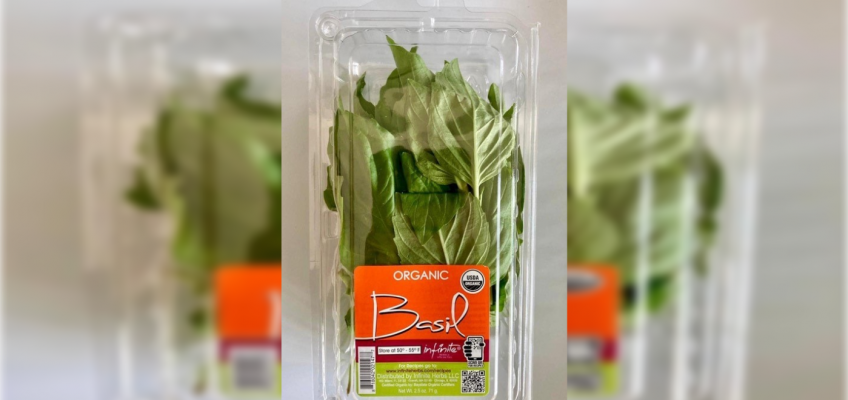Minnesota Department of Health and Department of Agriculture officials are warning consumers not to eat Infinite Herbs brand organic basil in 2.5-ounce clamshell-style containers purchased at Trader Joe’s due to a multistate salmonella outbreak announced by the U.S. Food and Drug Administration and Centers for Disease Control and Prevention
This Infinite Herbs brand organic basil in 2.5-ounce clamshell-style containers sold at Trader Joe’s has been recalled after a salmonella outbreak.(Courtesy of the Centers for Disease Control and Prevention)
Health officials report that four Minnesotans between 3 and 59 years of age, all from the Twin Cities metro area, became ill between Feb. 15 and March 27. None of them were hospitalized and none died, the health department reports in a news release issued on Thursday. Their illnesses have been linked to eating Infinite Herbs brand basil purchased at Trader Joe’s.
Nationally, a total of 12 people infected with the outbreak strain of salmonella have been reported from seven states. One person was hospitalized.
The basil was sold at Trader Joe’s stores in 29 states, including Wisconsin, as well as in Washington, D.C., according to the CDC.
Traceback data collected by FDA determined that Infinite Herbs LLC, in Miami, was the supplier of the 2.5-oz packages sold at Trader Joe’s stores, according to the CDC’s investigation info.
Infinite Herbs is cooperating with the FDA investigation, the CDC reports, and has agreed to initiate a voluntary recall.
“We are heartbroken that any item we sold may have caused illness or discomfort,” the company stated in a post on its Facebook page on Thursday. “We value your trust and are carrying out a thorough investigation into the cause.”
Trader Joe’s, which states in a recall on its website that the basil was sold in some of its stores from Feb. 1 through April 6, has removed the product from its shelves. Anyone who has it in their refrigerator or freezer should throw it away, health officials say.
Also, the FDA recommends extra care in cleaning and sanitizing any surfaces and containers that may have come in contact with this product to reduce the risk of cross-contamination.
Since many people with salmonella infection (salmonellosis) do not seek health care or get tested, the number of ill people that are part of this outbreak is likely to be larger than the identified cases. People who became sick after consuming this product and are concerned about their health should consult their health care provider and mention this outbreak.
Symptoms of salmonella infection include diarrhea, abdominal pain and fever. Symptoms usually begin within 12 to 96 hours after exposure, but they can begin up to two weeks after exposure. Infections usually clear in five to seven days, but about 28% of laboratory-confirmed cases require hospitalization. Many salmonella infections in otherwise healthy people do not require medical treatment. More serious infections occasionally occur. For those who seek health care, most do not require antibiotics.
Approximately 1,000 salmonella infections are reported each year in Minnesota. More information on salmonella and how to prevent it can be found on the MDH website at health.state.mn.us/diseases/salmonellosis.
Minnesota is working with the CDC and the FDA on this ongoing, multi-state investigation, according to the health department.
Related Articles
City-country mortality gap widens amid persistent holes in rural health care access
Lawsuit alleges Obamacare plan-switching scheme targeted low-income consumers
National Jewish study looks to sand as possible explanation for combat veterans’ breathing problems
With new PFAS limits, some east metro cities have big water cleanup jobs ahead
Fact check: Biden is right about $35 insulin cap but exaggerates prior costs for Medicare enrollees


Leave a Reply